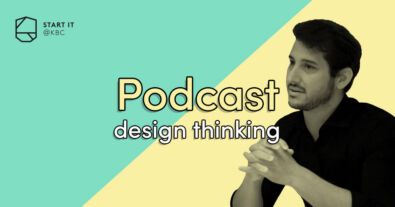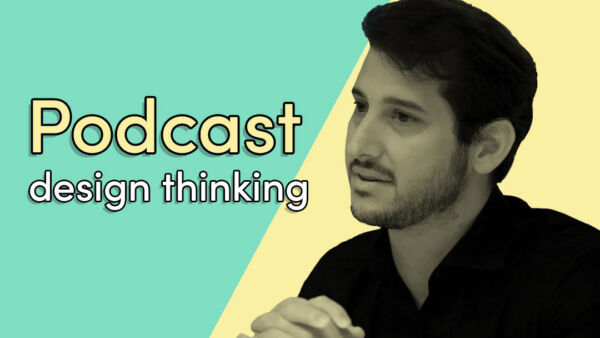“To me, design thinking is a state of mind. It’s what forces people to look differently at problems and their possible solutions.” With his definition of design thinking, Dennis De Clercq (Buffl) immediately reveals the most important element in the whole design thinking process: having the right view. In this podcast, we zoom in on the importance of customer centricity and unravel what corporates can learn from startups. (Spoiler: a lot!)

Subscribe to the Start it @KBC podcast now and don’t miss a single episode!
The Start it @KBC podcast is available on Soundcloud, Spotify and a lot of other listening platforms. Make sure to check out our Anchor profile where you can subscribe to different channels (Apple podcast, overcast, ...).
“Important decisions should be based on what the end user wants, not on office brainstorm meetings”, says Dennis De Clercq, co-founder of Buffl. “That’s why we created a mobile market research platform, and a community of people who are willing to give instant feedback and validation. Without all the hustle of setting up meetings, we bring them together through an easy to use mobile app. This allows companies to get the valuable feedback they need in just 30 minutes.”
Dennis insists that the connection with the potential end user is the most important element of design thinking. “Companies need to see that design thinking is a state of mind. It’s about looking at problems and their solutions differently. How? Simply ask yourself: ‘Am I creating something that people really need? Am I fixing someone’s problem?’.
Build, test, measure and repeat
Design thinking is not new at all, the term has been documented for over fifty years. But it only recently became a hype when big corporates started using it. “Corporates are finally beginning to understand that the traditional ways of innovating no longer work”, Dennis points out. “They have been investing enormous amounts of money in new products, only to see that 75% of them fails. You can’t keep blaming marketing for that.”
Building a product is easy, but testing and using those results to improve or even pivot completely, is something else. “Stay true to the loop of building, testing and measuring. And then repeat. If you’re not using the received feedback to improve your product, testing is pointless”, says Dennis.
Put the end user first
Creating that required mentality and behavior change, is one of the biggest challenges for corporates. Having the right mindset allows you to persist and eventually book results. “Put the end user first - not just when you’re defining the problem, but in the solution stage as well. Does your user want to use an app? Or will he prefer a browser version? Asking yourself essential user questions can have a huge impact. If you lose track of your end user, you’re just creating solutions where there is no market. Return to your user and change your product, pivot or pull the plug if you need to.”
“Design thinking is an obligation”
“As a startup, you have to keep questioning yourself without fearing negative feedback”, Dennis tells. “Otherwise you’ll be stuck sooner or later. That flexibility is a huge advantage for startups compared to corporates, which tend to be defensive and slow. Famous companies like Kodak and Nokia failed because they were afraid to truly innovate. All they did was make changes internally, in order to stay alive and keep making money. For startups, design thinking is an obligation.”
Do you have a question for the Start it @KBC community that you want answered in this podcast? Post it in the comments and you might find out the answer during the next episode!
The production of this podcast was made possible thanks to our strategic partners – KBC, Telenet, Cronos group, Accenture, Mobile Vikings, Flanders DC, Joyn, Imec and Universiteit Antwerpen.
Subscribe to the Start it @KBC podcast now and don’t miss a single episode!
Have you listened to the previous episodes? In episode 14 we delved into the remarkable startup story of Pieterjan Verhaeghen, co-founder of energy matchmaker Bolt. Episode 15 focused on the importance of PR for startups, with PR expert Saar Dietvorst and Hadrien Crespin, co-founder of the smart parking app Seety. In episode 16, we listened to Dimitri O, co-founder of Loop, the company that develops fashionable and comfortable earplugs.
